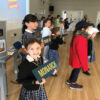by Kate Doran
www.veggienauts.com
Cooking with small children can be chaotic to say the least. But if you can embrace a little mess and allow them some autonomy, in amongst the madness there are so many exciting opportunities to learn.
This summer, keep your children entertained and teach them important life skills with these kitchen classroom favourites.
Reading
From shopping lists to recipe instructions, reading is an essential skill when it comes to cooking. Younger cooks will enjoy identifying letters – like ‘C is for carrot’ – or being read aloud to, whilst older children can gain real confidence by reading and following instructions by themselves.
Writing
Writing out and/or drawing steps for a favourite recipe is a great activity for little learners of all ages. Make shopping lists, jot down observations, or why not encourage your little cook to create their own recipe book as a record of what they’ve enjoyed making this summer?
Maths
Maths is everywhere you look in the kitchen, from measuring out ingredients to setting a timer. Younger cooks can get involved by counting scoops or spoonfuls out loud or identifying single numbers on packaging or scales.
Science
What makes cakes rise? Volume vs weight. Liquids vs solids. Science is a cook’s best friend and the kitchen is a brilliant place to experiment, often with delicious results. Why not set up a blind taste test and use smell, touch and finally taste to identify a rainbow of foods, recording your results for maximum science skills?
Art
If cooking is a science, there’s also a place in the kitchen for art. Decorating cupcakes, preparing a beautiful vegetable platter or simply laying the table and folding napkins are all opportunities for children to express their creative side.
History and culture
Every ingredient has a history. Encourage your child’s natural curiosity by talking about where an ingredient comes from or experiment with different world cuisines – a family meal themed to a different world cuisine each week is a great way to do this with so much scope to get creative with playlists, decorations and more.
Nutrition
Cooking together can provide the perfect opportunity to talk about the benefits of individual ingredients with your child. Orange foods give you super sight. Red foods keep your heart strong. Maybe runner beans help you run faster?!
Organisation
Not a topic you’ll find on the curriculum but one we could all do with more of. Portioning out equal quantities of dough for cookies, stacking bowls or loading the dishwasher are all examples of tasks that engage your child’s frontal lobe.
Confidence and independence
Understanding food, how to shop for, prepare and make their own recipes are skills that set children up for life. It can be stressful letting small children take the reins and often easier to do it yourself, but try to let your child have as much autonomy in the kitchen as possible and they’ll really reap the benefits in the long term.
Safety
Which brings us nicely to our final lesson, safety. With open flames, ovens, sharp knives, blenders, graters and more, the kitchen is a potentially dangerous place for small children. But with the right discussions they can learn important life lessons. Talk about the safe way to handle certain implements, the importance of staying away from the oven or maybe even write up a list of kitchen safety rules to stick on the fridge.
Small children are naturally curious. Getting them away from screens and into the kitchen is a brilliant way to make lasting family memories, learn life skills and try new things. Yes, cooking with children can be messy, but the rewards are endless.
Who knows, maybe by the end of the summer your little cooking companion will have learnt enough for you to be putting your feet up whilst they take control of the kitchen?
Kate Doran is a cookbook author, mum of three young children and founder of The Veggienauts Club,
a monthly vegetable discovery subscription box for children age 3 – 8.
To find out more and join the club visit www.veggienauts.com










